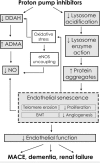Cardiovascular Risk of Proton Pump Inhibitors
- PMID: 31687101
- PMCID: PMC6822659
- DOI: 10.14797/mdcj-15-3-214
Cardiovascular Risk of Proton Pump Inhibitors
Abstract
Proton pump inhibitors (PPIs) are effective agents for the treatment of gastroesophageal reflux (GERD). However, these drugs have not been approved for long-term use. Now sold over the counter, these agents are being used chronically for GERD without medical supervision. The long-term use of PPIs may have significant adverse effects, in part mediated by their effect of accelerating vascular aging. Physicians should assist patients in tapering off their use of PPIs and replacing them with lifestyle modifications and/or other agents that have better long-term safety profiles.
Keywords: GERD; H2 antagonists; gastroesophageal reflux disease; proton pump inhibitor.
© 2019 Houston Methodist Hospital Houston, Texas.
Conflict of interest statement
Conflict of Interest Disclosure: Dr. Cooke is a scientific advisor to HumanN Inc., Merand Pharmaceuticals, Inc., and Fibralign Corporation and receives research funding from Cook Biotech, Inc. and VGXI, Inc.
Figures


References
-
- Pharmacist's Letter [Internet] Stockton, CA: Therapeutic Research Center; 2019. Proton pump inhibitors: appropriate use and safety concerns; 2019 Feb [cited 2019 Mar 27]. Available from: https://pharmacist.therapeuticre-search.com/Home/PL (#350214)
-
- Katz MH. Failing the acid test: benefits of proton pump inhibitors may not justify the risks for many users. Arch Intern Med. 2010;170(9):747–8. - PubMed
-
- Eid SM, Boueiz A, Paranji S, Mativo C, Landis R, Abougergi MS. Patterns and predictors of proton pump inhibitor overuse among academic and non-academic hospitalists. Intern Med. 2010;49(23):2561–8. - PubMed
-
- Lamberts R, Brunner G, Solcia E. Effects of very long (up to 10 years) proton pump blockade on human gastric mucosa. Digestion. 2001;64(4):205–13. - PubMed
Publication types
MeSH terms
Substances
LinkOut - more resources
Full Text Sources
Medical

